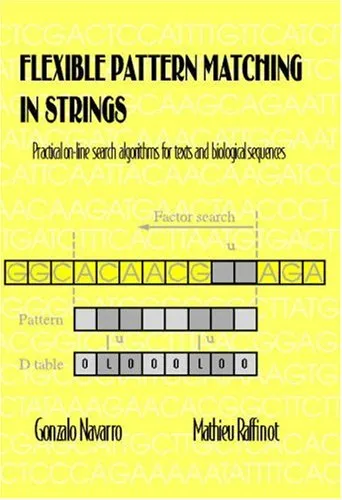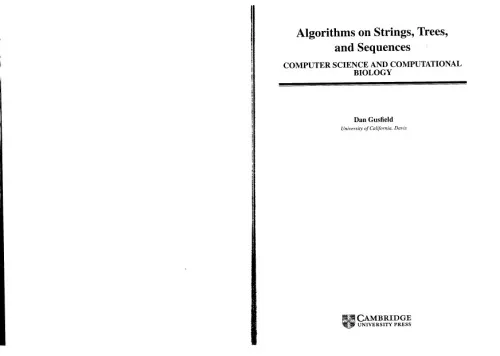Flexible Pattern Matching in Strings: Practical On-line Search Algorithms for Texts and Biological Sequences
4.7
Reviews from our users

You Can Ask your questions from this book's AI after Login
Each download or ask from book AI costs 2 points. To earn more free points, please visit the Points Guide Page and complete some valuable actions.Related Refrences:
Introduction to "Flexible Pattern Matching in Strings"
Welcome to "Flexible Pattern Matching in Strings: Practical On-line Search Algorithms for Texts and Biological Sequences." This book is a comprehensive exploration into the fascinating and highly practical realm of string processing and pattern matching, a cornerstone of modern computational science. Authored by Gonzalo Navarro and Mathieu Raffinot, this guide seeks to bridge the gap between theoretical computer science and real-world applications, particularly in fields as diverse as text processing and bioinformatics.
The art and science of searching for meaningful patterns in sequences, whether natural language or biological data, has evolved significantly over the years. Our book not only delves deep into online search algorithms but also equips readers with powerful, flexible tools to handle complex structures and irregularities in data. By coupling theoretical rigor with practical insights, we provide a roadmap to mastering this essential skill set.
Detailed Summary of the Book
In this book, we explore the rich landscape of flexible pattern matching, an advanced topic in string algorithms with applications spanning numerous domains. Unlike traditional exact pattern matching, where a query string must exactly match a substring, flexible pattern matching introduces tolerances or rules for "approximate" matches—making it highly relevant in real-world scenarios.
We begin by building foundational knowledge, introducing core concepts of string manipulation, coding schemes, and data structures like suffix trees, suffix arrays, and automata. The subsequent chapters dive into the heart of flexible pattern matching, explaining algorithms for approximate matching, regular expressions, and matching with "don't care" symbols.
You will also find detailed discussions on online versus offline pattern matching strategies, highlighting their strengths and trade-offs. Special emphasis is given to string matching in biological sequences, where approximate matching is particularly useful due to the inherent variability in DNA, RNA, and protein sequences.
This book balances theoretical depth with practical implementation advice. Numerous algorithms are described both conceptually and with pseudocode, enabling readers to translate them into working software. We also include performance analyses, comparisons, and use cases to help readers select the most suitable approach for their specific problems.
Key Takeaways
- Learn the fundamentals of string processing and how to construct essential data structures like suffix trees and arrays.
- Explore cutting-edge algorithms for flexible pattern matching, including approximate matching and regular expression techniques.
- Understand real-world applications in fields such as text retrieval, natural language processing, and bioinformatics.
- Gain practical insights and pseudocode implementations for adapting these algorithms to your unique requirements.
- Develop an appreciation for the balance between theoretical rigor and computational efficiency.
Famous Quotes from the Book
"Pattern matching is not merely a computational challenge but a window into understanding the complexities of structured data."
"Flexibility in string matching algorithms mirrors the flexibility and variability of the data itself, allowing us to find meaningful connections where rigid methods fail."
Why This Book Matters
"Flexible Pattern Matching in Strings" is more than just a guide to algorithms—it is a vital resource for anyone working with data. The methods outlined in this book address some of the most pressing challenges in modern computing, from efficiently searching vast databases to analyzing genomic sequences. As data science continues to grow, the ability to search, compare, and interpret data becomes even more crucial.
What sets this book apart is its focus on flexibility. By embracing approximate matching and other advanced techniques, readers can solve a broader range of problems. Whether you're a student of computer science, a professional software developer, or a researcher in bioinformatics, this book will empower you to tackle challenges that rigid algorithms cannot handle.
Ultimately, this book is a celebration of problem-solving in its purest form, providing the tools you need to make sense of the complex and unpredictable world of strings.
Free Direct Download
You Can Download this book after Login
Accessing books through legal platforms and public libraries not only supports the rights of authors and publishers but also contributes to the sustainability of reading culture. Before downloading, please take a moment to consider these options.
Find this book on other platforms:
WorldCat helps you find books in libraries worldwide.
See ratings, reviews, and discussions on Goodreads.
Find and buy rare or used books on AbeBooks.
1271
بازدید4.7
امتیاز50
نظر98%
رضایتReviews:
4.7
Based on 0 users review
"کیفیت چاپ عالی بود، خیلی راضیام"



